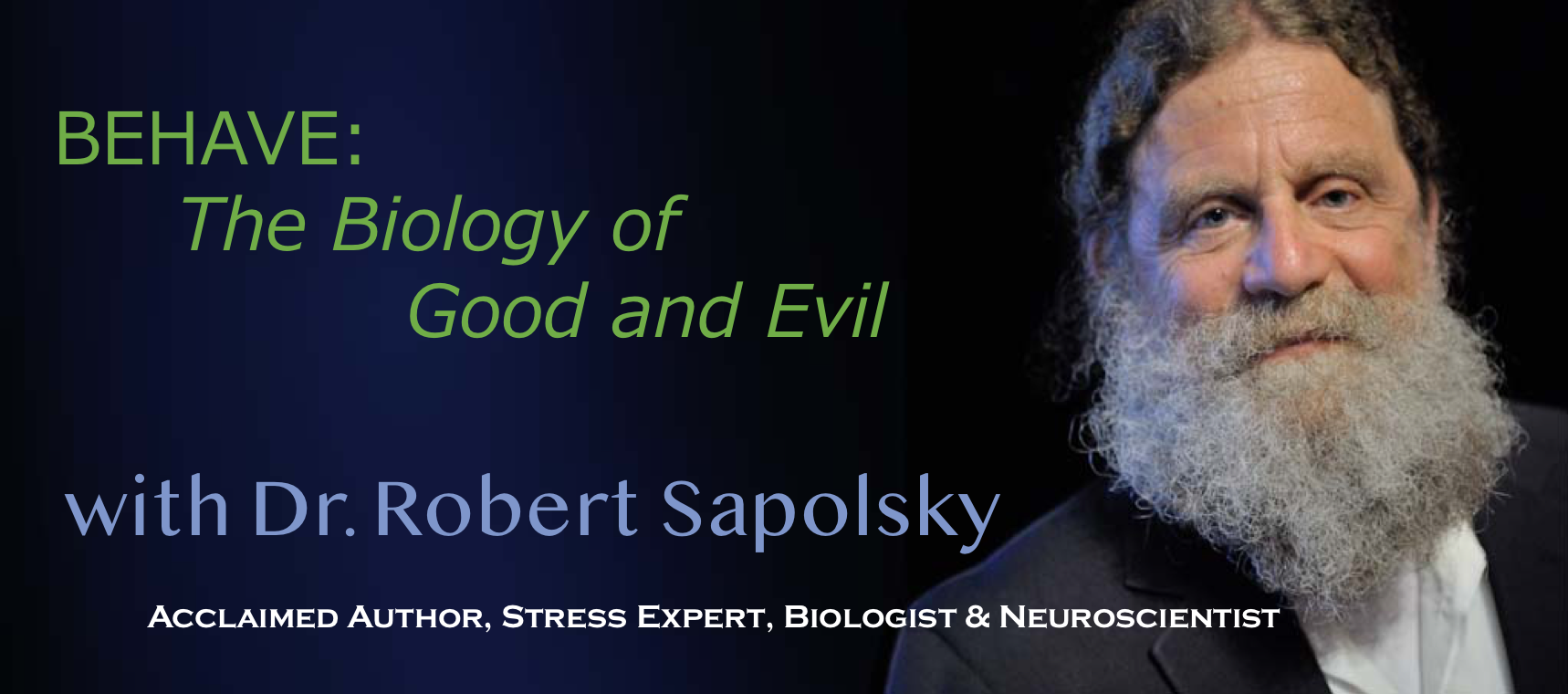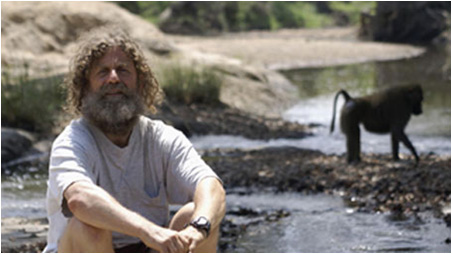
Photo Credit: Thompson-McClellan-Photography
February 27th, 2018 at 7:30pm – James R. Cox Auditorium
Opened Seating for this Event is on a First-Come, First-Served Basis: Doors Open at 6:45pm.
There are roughly 350 opened/non-reserved seats! So come early to ensure you get to see this brilliant speaker!!!
Event Information
The Psychology Graduate Student Association and its cosponsors are proud to welcome MacArthur “Genius” Fellow, and famed Stanford University professor of biology, Dr. Robert Sapolsky to the University of Tennessee. Here, he will give a 90 minute presentation (50-60 minute talk with 20-30 minute Q/A to follow) on the content covered in what is being called his magnum opus, Behave: The Biology of Humans at Our Best and Worst.
Taking him nearly 10 years to cobble together, this book beautifully synthesizes a vast array of information drawn from the many interdisciplinary fields of empirical research that make up modern-day “neuroscience” into an accessible and humorous explanation, from a biological perspective, of why we do the things we do. As such, it has been argued by many to be the best book of 2017, and was even named so by The Washington Post.
The most recent of several best-selling books, “Behave”, like those before it, is lauded in its ability to convey meaningful information without you realizing just how much you’ve learned. What’s more – it’s this seemingly effortless approach that makes his oral presentations such a joy to behold.
With over 1.3 million views already in just 9 months, his most recent TED Talk is a prime example of this. Check it out below!
In his visit to UT, he will explore even more questions related to why it is that we do so many of the hair-brained things that we do.
Covering a vast range of topics such as empathy, love, and altruism to aggression, fear, stress, and murder (and everything in between), we’ll learn the roles of everything from evolution and genetics to early life experiences to hormones and neuronal priming and more.
By seamlessly integrating these mechanisms into a novelly-presented timeline of influence, we’ll learn how critical regions of the brain like the prefrontal cortex (where decisions are made) and amygdala (where fear is made) come together to drive our actions. As we will see, this has important implications for concepts like blame and the ever-sensational, free will. For a little taste of this, check out a recent podcast excerpt from NPR’s TED Radio Hour (below).
Dr. Sapolsky has been a frequent guest on a vast array of programs, including the highly-popular podcast, RadioLab. You can even watch (for free!) his lectures for the very popular class he teaches at Stanford University, Human Behavioral Biology, the formation of which formed much of the basis for the very talk he’ll give here at UT.
Below is a list of just some of the other recent/popular programs featuring Dr. Sapolsky.
The Daily Show with Trevor Noah
PBS Special: Stress, The Portrait of a Killer
Alan Alda – Neuroscience, The Law, and Free Will
Sam Harris’s ‘Waking Up’ Podcast
Shane Mauss’s ‘Here We Are’ Podcast
“Robert Sapolsky is one of the best scientist-writers of our time, able to deal with the weightiest topics both authoritatively and wittily, with so light a tough they become accessible to all.”
– Dr. Oliver Sacks
“One of the finest natural history writers around.”
– New York Times
Bio of Dr. Robert Sapolsky
(from The Barclay Agency)
In fact, he chose to live with the baboons because they are perfect for learning about stress and stress-related diseases in humans. Like their human cousins, baboons live in large, complex social groups and have lots of time, Dr. Sapolsky writes, “to devote to being rotten to each other.” Just like stressed-out people, stressed-out baboons have high blood pressure, high cholesterol, and hardened arteries. And just like people, baboons are good material for stories. His gift for storytelling led The New York Times to suggest, “If you crossed Jane Goodall with a borscht-belt comedian, she might have written a book like A Primate’s Memoir,” Dr. Sapolsky’s account of his early years as a field biologist.
The uniqueness of Dr. Sapolsky’s perspective on the human condition comes from the ease with which he combines his insights from the field with his findings as a neuroscientist. For more than thirty years Sapolsky has divided his time between field work with baboons and highly technical neurological research in the laboratory. As a result, he can effortlessly move from a discussion of pecking orders in primate societies (human and baboon) to an explanation of how neurotransmitters work during stress—and get laughs doing it.

The problem for people, as Dr. Sapolsky explains in his book Why Zebras Don’t Get Ulcers, is that our bodies’ stress response evolved to help us get out of short-term physical emergencies—if a lion is chasing you, you run. But such reactions, he points out, compromise long-term physical health in favor of immediate self-preservation. Unfortunately, when confronted with purely psychological stressors, such as troubleshooting the fax machine, modern humans turn on the same stress response. “If you turn it on for too long,” notes Sapolsky, “you get sick.” Sapolsky regards this sobering news with characteristic good humor, finding hope in “our own capacity to prevent some of these problems…in the small steps with which we live our everyday lives.”
In addition to A Primate’s Memoir, which won the 2001 Bay Area Book Reviewers Award in nonfiction, Robert Sapolsky has written The Trouble with Testosterone, Why Zebras Don’t Get Ulcers, and Monkeyluv and Other Essays on our Lives as Animals. His most recent book, Behave: The Biology of Humans at Our Best and Worst, is a Washington Post Best Book of 2017. Dr. Sapolsky was awarded Rockefeller University’s Lewis Thomas Prize for Writing about Science for 2008. His articles have appeared in publications such as Discover and The New Yorker, and he writes a biweekly column for the Wall Street Journal entitled “Mind & Matter.”
Dr. Sapolsky is a MacArthur “Genius” Fellow, a professor of biology and neurology at Stanford University, and a research associate with the Institute of Primate Research at the National Museum of Kenya. In 2008, National Geographic & PBS aired an hour-long special on stress featuring Dr. Sapolsky and his research on the subject. The humor and humanity he brings to sometimes-sobering subject matter make Dr. Sapolsky a fascinating speaker. He lectures widely on topics as diverse as stress and stress-related diseases, baboons, the biology of our individuality, the biology of religious belief, the biology of memory, schizophrenia, depression, aggression, and Alzheimer’s disease.
It is with unending gratitude that The Psychology Graduate Student Association would like to thank its cosponsors for allowing this event to happen.
Specifically:
The University of Tennessee Student Programming Allocation Committee
The Pat Summitt Foundation
NeuroScience Associates
The Department of Psychology at The University of Tennessee
The Department of Philosophy at The University of Tennessee
The NeuroNET Research Center
The Undergraduate Neuroscience Program at The University of Tennessee
The NeuroNET Chapter of The Society for Neuroscience

